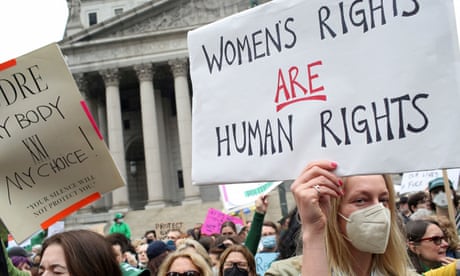- by foxnews
- 09 Mar 2025
The supreme court just overturned Roe v Wade - what happens next?
The supreme court just overturned Roe v Wade - what happens next?
- by theguardian
- 25 Jun 2022
- in news

The supreme court just overturned the landmark Roe v Wade case, which granted women in the US the right to terminate a pregnancy. A reversal of this magnitude is almost unprecedented, particularly on a case decided nearly 50 years ago.
The extraordinarily rare move will allow more than half of states to ban abortion, with an immediate and enduring impact on tens of millions of Americans.
The court decided there is no constitutional right to abortion in a case called Dobbs v Jackson Women's Health Organization. In reaching that decision, the conservative-majority court overturned Roe v Wade, from 1973.
Historically, the court has overturned cases to grant more rights. The court has done the opposite here, and its decision will restrict a constitutional right generations of Americans have grown up taking for granted.
As a result of the reversal, states will again be permitted to ban or severely restrict abortion, changes that will indelibly alter the national understanding of liberty, self-determination and personal autonomy.
Twenty-six states are expected to do so immediately, or as soon as practicable. This will make abortion illegal across most of the south and midwest.
In these states, women and other people who can become pregnant will need to either travel hundreds of miles to reach an abortion provider or self-manage abortions at home through medication or other means.
However, anti-abortion laws are not national. The US will have a patchwork of laws, including restrictions and protections, because some Democratic-led states such as California and New York expanded reproductive rights in the run-up to the decision.
Even so, new abortion bans will make the US one of just four nations to roll back abortion rights since 1994, and by far the wealthiest and most influential nation to do so. The other three nations to curtail abortion rights are Poland, El Salvador and Nicaragua, according to the Center for Reproductive Rights. More than half (58%) of all US women of reproductive age - or 40 million people - live in states hostile to abortion.
Across most states, this will happen quickly. Thirteen states have abortion bans "triggered" by a reversal of Roe v Wade, though the laws vary in their enforcement dates. Louisiana, for example, has a trigger law that is supposed to take effect immediately. Idaho has a trigger ban that goes into effect in 30 days.
Other states have abortion bans that pre-date the Roe decision, but have been unenforceable in the last five decades. Michigan has a pre-Roe ban that is currently the subject of a court challenge.
A final group of states intends to ban abortion very early in pregnancy, often before women know they are pregnant. One such state is Georgia, where abortion will be banned at six weeks. Several states, such as Texas, have multiple bans in place.
In many cases, court challenges under state constitutions are likely, and experts believe there will be chaos for days or weeks as states implement bans.
The most effective protection against state abortion bans is a federal law, which would precede the states. Public opinion favors such statute - 85% of Americans believe abortion should be legal in most or all circumstances.
Such a law would need the majority support of the House of Representatives, a 60-vote majority in the Senate, and a signature from Joe Biden to pass. A majority of members of the House of Representatives support an abortion rights statute, as does the White House.
However, Republicans are almost certain to block abortion rights laws in the Senate, which is evenly split with Democrats. One Democratic senator, Joe Manchin of West Virginia, has repeatedly crossed party lines to vote against abortion rights. That leaves just 49 Democrats, far short of the support needed to pass such a measure.
To overcome the evenly split Senate, Democrats would need to win landslide victories in the upcoming midterm elections. However, despite the fact that popular opinion favors abortion rights, it is unclear how the midterms could be swayed by the issue.
And, regardless of the outcome of the next election, Dobbs will forever change life in the US. The lives of individuals will be irrevocably altered as people are denied reproductive healthcare, face long journeys or are forced to give birth.
- by foxnews
- descember 09, 2016
'Speaker scum' on flights sparks debate among travelers: 'This is getting out of hand'
A traveler asked social media users to weigh in on flyers who play audio aloud on their devices and don't use headphones.
read more


